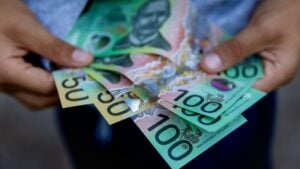ASX health stocks rise 2% in past five days as broader markets lift 0.6%
Morgans upgrades disinfectant device maker Nanosonics after positive trading update
Neuren receives rare paediatric disease designation from FDA for NNZ-2591 in Phelan-McDermid Syndrome
Healthcare and life sciences expert Scott Power, who has been a senior analyst with Morgans Financial for 27 years, explains what the movers and shakers have been doing in health and gives his ASX Powerplay.
Are you a night owl or a morning person? Researchers at Imperial College London investigating the effect of sleep on brain performance have found a link between an individual’s preference for morning or evening activity and their brain function, with self-declared ‘night owls’ generally tending to have higher cognitive scores.
The researchers examined data from more than 26,000 people from the extensive UK Biobank database to find out how different aspects of sleep, including duration, patterns, and quality affected mental sharpness and overall cognitive ability.
The researchers analysed cognitive test results, examining sleep duration and found that seven to nine hours of sleep optimises brain function, while less than seven or more than nine hours is detrimental.
‘Night owls’ or adults naturally more active in the evening scored higher on tests than the ‘morning larks,’ more active in the mornings, while a mixture of both also did better.
The analysis considered factors like age, gender, lifestyle, and chronic diseases, finding younger, healthier individuals performed better.
And don’t worry too much if you suffer insomnia. People reporting insomnia did not score significantly lower in cognitive performance in their cohorts.
Lead author of the study, Dr Raha West, says its important to note that the research doesn’t mean all morning people have worse cognitive performance.
“The findings reflect an overall trend where the majority might lean towards better cognition in the evening types,” she says.
West says while it’s possible to shift your natural sleep habits by gradually adjusting your bedtime, completely changing from a morning to an evening person is no simple task.
“It’s equally important to remember to get just enough sleep, not too long or too short,” she says.
This is crucial for keeping your brain healthy and functioning at its best.”
To markets…
ASX healthcare stocks look like they’ve been getting the right amount of sleep this week. At 11.15pm (AEDT) on Friday the S&P/ASX 200 healthcare index (ASX:XHJ) was up 2%, while the benchmark S&P/ASX 200 (ASX:XJO) rose 0.6% for the same period. (Ed’s note: At the time we’ve actually published this, things have since dipped just a tad, intraday.)
Power who has just returned, along with me, from the Bioshares Biotech Summit in Fremantle says the healthcare side of the market has had a solid week.
He says despite ongoing geopolitical risk there is an expectation that interest rates have peaked around the world and are starting to come down, which will continue to encourage investment back into the market.
“There is a lot of liquidity out there and certain sectors have had strong runs and I think it’s now rotating into healthcare and life sciences,” he says.
“From the Bioshares summit sentiment was very positive and it feels like a rising tide in the healthcare market.”
Morgans upgrades Nanosonics after positive trading update
Nanosonics (ASX:NAN) has risen this week after providing a positive trading update with the disinfection device maker now expecting revenue of $170m for FY24, the upper end of its revenue guidance range of $164m to $171m.
NAN says it’s experienced robust growth in capital and consumables sales in H2 FY24, with revenue up to $90.4m, a 14% increase compared to the first half.
The top end of its its gross margin of 76-78% is now also anticipated, which Morgans says would imply a gross profit of ~$132.6m, which was marginally higher than the consensus estimate of $129m.
NAN says 3,850 of its probe sterilisation Trophon units were placed during the year, including 2,340 new installations and 1,510 upgrades.
Growth was seen across all regions, with North America, EMEA, and APAC all showing an increase in new installations and upgrades.
NAN says despite ongoing market challenges associated with hospital capital budget constraints in its major market of North America, the company has improved its sales conversion timeline in the second half.
Power says the launch of its second product – Coris – is the next big catalyst for NAN.
Coris is a device intended to improve the current tedious practice for cleaning flexible probes commonly used in procedures such as colonoscopies, gastroscopies, enteroscopies, endoscopic ultrasounds and bronchoscopies.
Nanosonics says Coris delivers a “novel sonicated mist” that accesses “all probe surfaces including body, handle and all crevices”, in turn improving infection control and reducing the risk of pathogens on the probes, which can be transferred to patients.
“The key catalyst the market has been focused on is the launch of CORIS, to disinfect flexible endoscopes and that is working its way through the approval process,” he says.
NAN has in the past been a been target of short-sellers but its short position has come down and is currently 5.5%.
Morgans maintains an add rating on NAN and has upgraded its 12-month target price from $3.5 to $3.75.
Morgans upbeat on Polynovo
Power says he is expecting a solid FY24 result in August from wound-care company PolyNovo (ASX:PNV) with solid revenue growth achieved in H1 FY24 set to continue into the second half and for the next three years.
Morgans was pleasantly surprised with a modest positive EBITDA number at the H1 FY24 result, which Power expects should be repeated in the the second half with investors likely to reward the company’s move into profitability.
“We expect a solid full-year result from Polynovo in August with over $100 million in sales and a modest profit,” Power says.
“If we look at consensus forecasts of sales going forward for the next three years it’s growing in excess of 25% per annum.
“Polynovo is a good growth story and we think their share price is going to move higher over time.”
Morgans maintains an add rating on PNV and has upgraded its 12-month target price from $2.22 to $2.50.
Neuren receives Rare Paediatric Disease Designation from FDA
Ahead of release of clinical trial results for Angelman Syndrome Neuren Pharmaceuticals (ASX:NEU) has received Rare Paediatric Disease (RPD) designation from the US Food and Drug Administration (FDA) for NNZ-2591 – developed to treat Phelan-McDermid Syndrome (PMS), known to be a rare disease that, primarily, affects some children.
An RPD designation is granted by the FDA for serious or life-threatening diseases affecting fewer than 200,000 patients in the US.
“If the product is ultimately approved, NEU may now qualify for a priority review voucher that can be redeemed to receive priority review for a different product or sold,” Power says.
“These PRVs can be sold for up to US$100m, so potentially a nice win fall for NEU.”
Neuren says it is now is preparing for an end of Phase 2 meeting with the FDA in Q3 2024 to discuss the development program for NNZ-2591 in PMS, for which there is currently no FDA approved drug.
The company previously reported results from a Phase 2 trial in which significant improvement was assessed by both clinicians and caregivers across multiple efficacy measures.
In 2023 Neuren became the market darling of the ASX healthcare sector after receiving US FDA approval via its US marketing partner for Trofinetide, selling under the name Daybue, to treat Rett’s Syndrome.
Power says the countdown is on for another key catalyst for NEU. The company is expecting positive clinical trial results of NNZ-2591 into another rare disease called Angelman Syndrome within a month.
“The market is keenly watching the soon to-be-released Angelman syndrome Phase 2 results,” he says.
Focus on near-term catalysts
Power says investors are now focused on companies with near-term catalysts, noting: “Those companies with near-term catalysts are certainly attracting attention.”
Among companies with near-term catalysts, Power flags Actinogen Medical (ASX:ACW), which is developing potential treatments for neurological conditions including Alzheimer’s disease and depression.
The company has seen its share price rise ~23% in the past five days as the market anticipates Phase 2a clinical trial results of its compound results in major depressive disorder (MDD) due early August 2024.
Top line results will read out for the Phase 2a randomised, double-blinded, placebo-controlled trial in 167 patients for persistent MDD.
ACW’s compound Xanamem (10mg) or placebo will be added (once daily oral) to the existing therapy in the trial.
ScoPo’s Powerplay – more catalysts coming for Dimerix
Dimerix (ASX:DXB) is Power’s pick of the week. DXB is currently running a Phase 3 multi-centre, randomised, double blinded, placebo-controlled trial of its lead drug DMX-200, known as ACTION3, to treat a rare kidney disease called Focal Segmental Glomerulosclerosis (FSGS).
The disease attacks the kidney’s filtering units where the blood is cleaned causing irreversible scarring leading to permanent kidney damage.
DXB announced in March the Phase 3 trial achieved success in its pre-specified interim analysis of the proteinuria (efficacy) endpoint, based on data from the initial 72 randomised patients.
The interim analysis indicates that DMX-200 is currently outperforming the placebo in reducing proteinuria, as measured statistically, within a significantly larger participant group compared to its earlier Phase 2 trial involving eight patients.
The second interim analysis (Part 2) of 144 patients is expected mid-2025. Power says if the read-out is positive it may be possible for DXB to submit for accelerated marketing approval with the US FDA, which would be a major catalyst for the company.
Furthermore, DXB has secured two major licensing deals for DXB-200. The company announced in May the sale to Taiba of exclusive rights to register and commercialise DMX-200 for the treatment of kidney disease in key Middle East countries in a deal worth ~$120.5m.
In October 2023, DXB inked a deal with Advanz Pharma worth $230m in upfront and milestone payments, plus royalties covering the European Economic Area, UK, Switzerland, Canada, Australia, and New Zealand for commercialisation of DMX-200 for the treatment of FSGS following regulatory approval.
“Other regions including US and China are yet to be licensed out and become a potential catalyst,” Power says.
“Timing of executing any deal is always difficult to predict, however the company has flagged that good interest is being shown from potential partners.”
At Stockhead, we tell it like it is. While Dimerix is a Stockhead advertiser, the company did not sponsor this article.
The views, information, or opinions expressed in the interview in this article are solely those of the interviewee and do not represent the views of Stockhead. Stockhead has not provided, endorsed or otherwise assumed responsibility for any financial product advice contained in this article.
The post ScoPo’s Powerplays: ASX health stocks rise amid renewed positive sentiment appeared first on Stockhead.






















